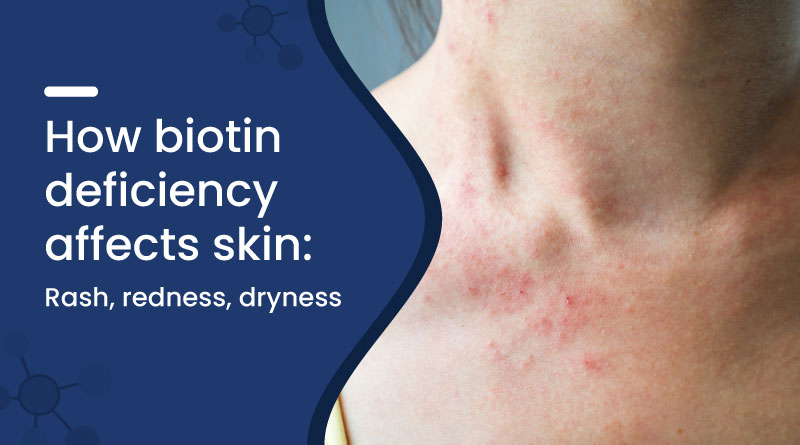How Biotin Deficiency Affects Skin: Rash, Redness, Dryness


Biotin deficiency can cause skin issues such as rash, redness, and dryness. Biotin (Vitamin B7) is vital for healthy skin. When your body lacks this vitamin, early signs often show up on your skin. In this blog, we’ll discuss how biotin deficiency affects the skin and how to manage it with the right approach.
What is Biotin and Why is it Important for Skin?
Biotin is a B-complex vitamin that supports skin hydration and regeneration. It plays a vital role in fatty acid synthesis, which helps keep your skin soft, smooth, and moisturized. Without enough biotin, the skin’s protective barrier breaks down, resulting in various problems such as dryness, dullness, and irritation.
How Does Biotin Deficiency Cause Skin Rash?
A lack of biotin can lead to red, itchy rashes, especially around the eyes, mouth, and nose. Biotin supports the production of skin cells and essential fats. When deficient, your skin becomes inflamed and more susceptible to infections.
Common symptoms include:
- Red, scaly patches
- Itching or burning sensation
- Flaky skin around facial areas
Biotin supplementation can help reduce inflammation and improve skin condition over time.
Can Biotin Deficiency Lead to Skin Redness?
Yes, biotin deficiency may result in visible skin redness. This happens due to the skin's weakened barrier, which increases sensitivity and inflammation. Redness can appear as flushing, blotches, or irritated patches—especially on the face.
You may also notice:
- Irritation after using skincare products
- Redness that worsens with sun exposure
- Skin discomfort without clear cause
Restoring biotin levels can gradually calm the skin and reduce sensitivity.
Why Does Biotin Deficiency Cause Dry and Flaky Skin?
Biotin keeps skin moist and smooth; its deficiency leads to dryness and peeling. The body’s ability to regenerate healthy skin cells is compromised, leading to dullness.
Signs of dryness caused by biotin deficiency:
- Rough texture and peeling
- Cracks near the mouth or eyes
- Tightness after cleansing
This dryness can be reduced by taking biotin supplements along with following a simple, hydrating skincare routine.
Which Supplements Help with Biotin Deficiency?
To tackle biotin deficiency and improve skin health, the following supplements can be effective:
| Product | Key Benefits |
|---|---|
| Zeelab Biotin 60 Tablets | Improves texture, hydrates skin, and boosts elasticity. |
| Vitahix-5 Tablets | Combines biotin with other B-vitamins for better skin nourishment. |
| Vitahix-F Tablets | Contains biotin and iron to reduce dullness and improve skin tone. |
These supplements are formulated to address vitamin deficiencies that impact your skin. Regular use can restore hydration, reduce redness, and prevent further skin issues.
How to Prevent Skin Problems Caused by Biotin Deficiency?
Biotin deficiency can be prevented with the right dietary and lifestyle changes. Here's how:
- Include biotin-rich foods like eggs, nuts, seeds, and oats
- Avoid raw egg whites, which reduce biotin absorption
- Use supplements if you’re at higher risk (e.g., pregnancy, alcohol abuse, certain medications)
- Drink enough water to keep your skin hydrated
- Follow a simple skincare routine using mild, non-irritating products
Frequently Asked Questions
Q. What are the early signs of biotin deficiency on the skin?
A. Redness, flaking, and rash around the mouth and eyes are common early symptoms.
Q. Can biotin deficiency lead to more serious skin issues?
A. Yes, if untreated, it may cause infections and severe dryness.
Q. Who is most at risk for biotin deficiency?
A. Pregnant women, people with poor diets, and those taking antibiotics or anti-seizure medications are more vulnerable.
Q. Can biotin supplements clear up skin problems completely?
A. They can help improve skin health, but consistent use and a healthy diet are also important.
Q. How long does it take for skin to improve after taking biotin?
A. You may start seeing results in 2–4 weeks, but noticeable improvements may take a few months.
Conclusion
Biotin deficiency directly affects the skin, leading to rashes, redness, and dryness. These symptoms can be frustrating and affect your appearance and comfort. However, the good news is that they can often be reversed through biotin-rich foods and reliable supplementation. Addressing the deficiency early can restore your skin's moisture, calm redness, and bring back its natural glow. Consult a doctor if symptoms persist.
Recent Blogs
Disclaimer : Zeelab Pharmacy provides health information for knowledge only. Do not self-medicate. Always consult a qualified doctor before starting, stopping, or changing any medicine or treatment.
















 Added!
Added!